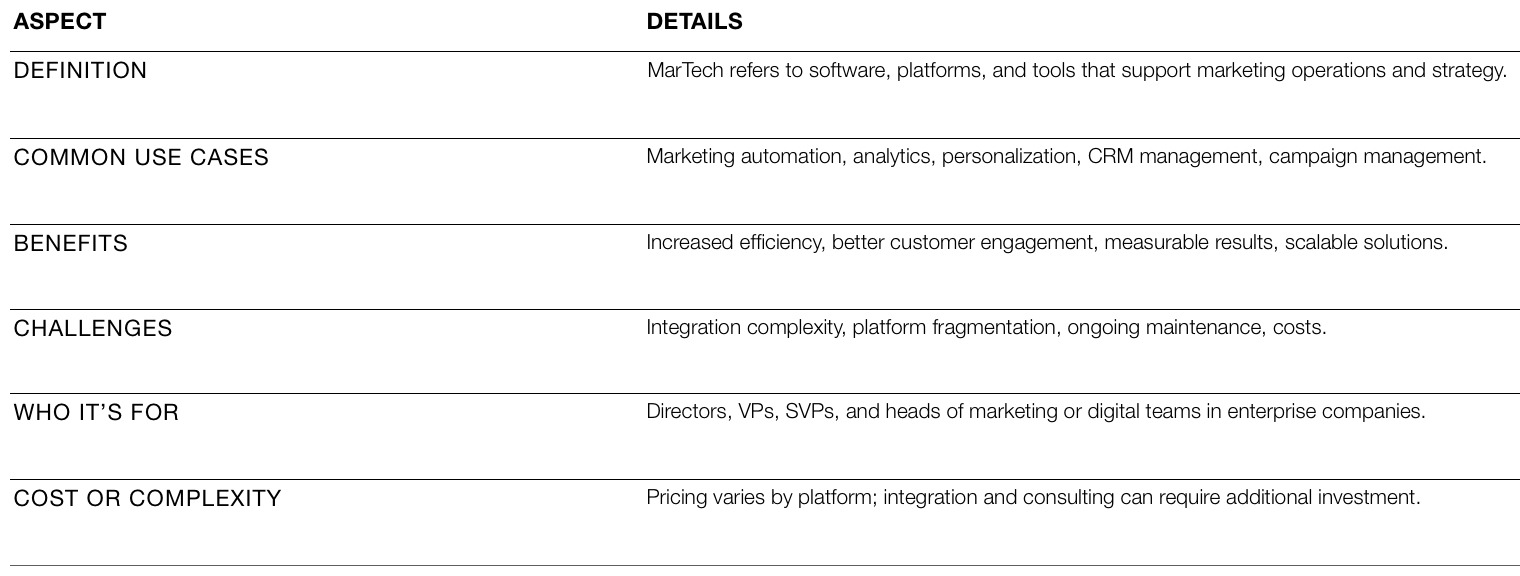
MarTech Explained: Platforms, Tools & Solutions FAQs
Introduction
Marketing technology, or MarTech, can be confusing for enterprise leaders. Many organizations struggle to choose the right platforms, integrate tools effectively, or measure ROI. Without clear guidance, companies risk investing in software that doesn’t deliver value.
This article explains what MarTech is, the solutions and platforms available, and how enterprise brands can use them strategically. It is designed for directors, VPs, SVPs, and heads leading marketing and digital initiatives in large organizations. By the end, you will understand key MarTech concepts, options, and considerations for selecting and integrating tools to boost performance.
Market Context: Disruption & Opportunity
The marketing technology landscape is rapidly evolving. Businesses face pressure to deliver personalized experiences while managing an increasing number of platforms. Many enterprises use fragmented tools, leading to inefficiencies and lost data. Integration challenges and lack of expertise often prevent teams from realizing full potential.
Investing in the right MarTech solutions can improve efficiency, enhance customer engagement, and generate measurable ROI. Enterprise leaders who strategically adopt platforms gain a competitive edge. Organizations that delay or mismanage technology investments risk falling behind peers.
FAQs Snapshot

What is MarTech?
MarTech, short for marketing technology, refers to software, platforms, and tools that support marketing operations, automation, analytics, and strategy. It helps organizations optimize campaigns, track customer interactions, and improve decision-making.
What is the meaning of MarTech?
MarTech meaning centers on the intersection of marketing and technology. It includes systems that manage campaigns, analyze data, and connect with customers across channels. Its goal is to make marketing more efficient, measurable, and scalable.
Which MarTech solutions are most effective for enterprise brands?
Effective MarTech solutions vary based on goals. Common solutions include marketing automation platforms, CRM systems, data analytics tools, personalization engines, and integration software. These platforms help enterprises streamline processes and enhance customer experiences.
How do MarTech platforms and tools integrate with existing systems?
MarTech integrations connect tools like CRMs, email platforms, and analytics software. Proper integration ensures data flows smoothly between systems, enabling unified reporting and consistent customer experiences. Enterprises often rely on consulting support to manage integrations efficiently.
Why should companies consider MarTech consulting?
MarTech consulting helps organizations evaluate platforms, design integrations, and optimize workflows. Consultants provide guidance on selecting software, implementing solutions, and measuring outcomes. Consulting reduces risks and accelerates ROI from technology investments.
Which MarTech companies are leading in the market?
MarTech companies range from global software providers to specialized niche firms. Leading companies offer platforms for marketing automation, analytics, personalization, and integrations. Selection depends on enterprise size, objectives, and integration requirements.
Can MarTech tools scale with my business?
Most MarTech tools are designed to scale. Cloud-based platforms, modular software, and API-driven integrations allow enterprises to grow usage, add new features, and expand teams without losing efficiency. Scalability is a key consideration when choosing solutions.
Benefits of MarTech Solutions
MarTech solutions offer enterprises several advantages. They improve efficiency, enhance customer engagement, and enable data-driven decision-making.
Adopting MarTech platforms helps organizations automate repetitive tasks, reduce errors, and increase marketing team productivity. Tools provide advanced analytics, enabling precise campaign measurement and optimization. Integrated solutions ensure consistent messaging across channels. Consulting services support implementation, ensuring platforms deliver maximum value. Companies also benefit from flexibility, scalability, and access to innovative technologies that adapt to evolving market needs.
Quick Summary Table

Let’s kickstart the conversation and design stuff people will love.

Deep-Dive Sections

What It Is & Why It Matters
MarTech includes software and tools that automate marketing tasks, centralize data, and enhance strategy. It matters because enterprises must deliver personalized, timely campaigns while managing multiple channels. Without technology, marketing teams face inefficiencies and fragmented data.
How It Works
MarTech works by integrating platforms, software, and tools. Automation platforms schedule campaigns, analytics tools track performance, and integration software ensures data flows across systems. Users gain insights, optimize campaigns, and maintain consistent customer experiences.
When to Use It (and When Not To)
Enterprises should adopt MarTech when aiming to scale marketing operations, improve analytics, or enhance personalization. It is less valuable for organizations with minimal digital engagement or simple marketing needs. A phased approach ensures investment aligns with strategic priorities.
Tools or Platforms Involved
Common tools include marketing automation platforms, CRM software, analytics dashboards, personalization engines, and integration tools. Leading MarTech platforms often offer modular features that can be expanded as needs grow.
Cost Considerations
Costs vary based on platform size, number of users, and integration complexity. Enterprise-level software often requires consulting and support fees. ROI should be measured by efficiency gains, increased engagement, and revenue impact.
Integration or Setup Requirements
MarTech integrations connect multiple systems to share data and streamline workflows. Successful setup requires planning, technical expertise, and sometimes external consulting. Poor integration can lead to data silos and reduced platform value.
Scalability & Flexibility
Cloud-based platforms, APIs, and modular tools ensure MarTech can scale with enterprise growth. Flexible solutions allow teams to add features, expand campaigns, and integrate new technologies without disrupting existing workflows.
Alternatives or Comparisons
Alternatives include manual processes, single-platform solutions, or niche tools with limited functionality. Comparing solutions on features, integration capabilities, and support ensures enterprises select the right combination for their needs.
Trends
Current MarTech trends include AI-driven personalization, unified data platforms, advanced analytics, and cross-channel integration. Enterprises are increasingly adopting tools that improve real-time decision-making and customer experience.
Pros and Cons
Pros: efficiency, scalability, data-driven insights, improved engagement.
Cons: integration complexity, cost, maintenance requirements, learning curve for teams.
How G&Co. Can Help

G&Co. has extensive experience guiding enterprise brands through MarTech adoption. We provide strategic consulting, platform selection, and integration services. Our team helps define technology requirements, optimize workflows, and ensure platforms deliver measurable results. Talk to us to clarify your strategy and move forward with confidence.
Conclusion & Next Steps
This article clarified what MarTech is, the platforms, tools, and integrations involved, and the benefits for enterprise brands. Leaders now have a framework to evaluate solutions, plan adoption, and optimize campaigns.
At G&Co., we have worked alongside clients to implement digital strategy, platform modernization, and workflow optimization. Our expertise enables brands to translate MarTech investments into tangible performance gains. Still have questions? Reach out and let’s solve them together.






%20(1).png)






